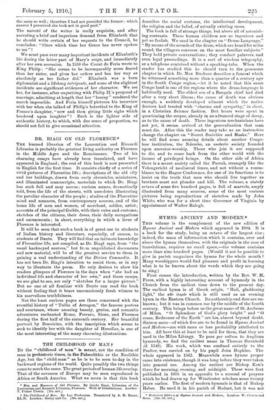THE CHILDHOOD OF MAN.t BY the "childhood of man "
is meant, not the condition of man in prehistoric times, in the Palaeolithic or the Neolithic Age, but the " child-man " as he is to be seen to-day in the backward regions of the world. Quite possibly the two things come to much the same. The great periods of human life overlap. That of the cavemen of Europe may be seen reproduced in Africa or South America. What we mean is that this book
• Man and Manners of Old Florence. By Guido Biagi, Librarian of the Laurentian and Riccardi Libraries, Florence. With 49 Illustrations. London : T. Fisher lJnwin. [15s. net.]
t The Ch.B.:Blood of Man. By Leo Frobenius. Translated bp A. H. Reane, LL.D. London : Seeley and Co. [16s. net.] describes the social customs, the intellectual development, the religion and the belief, of actually existing races.
The book is full of strange things, but above all of astonish- ing contrasts. These human children are so ingenious and yet so foolish. We read in the chapter on "Drum-Language," "By means of the sounds of the drum, which are heard for miles round, the villagers converse on the most familiar subjects." They hold private conversations ; they conduct palavers, and even legal proceedings. It is a sort of wireless telegraphy, or a telephone contrived without a speaking-tube. When the reader has studied this he should turn to the gruesome chapter in which Dr. Max Buchner describes a funeral which he witnessed something more than a quarter of a century ago in the South Congo region,—let it be noted that this same Congo land is one of the regions where the drum-language is habitually used. The eldest son of a Bangala chief had died. after a very short illness ; the cause of death was obvious enough, a suddenly developed ailment which the native doctors had treated with "charms and sympathy," in short, in a Christian Science fashion. But hours were spent in questioning the corpse, already in an advanced stage of decay, as to the cause of death. These ingenious mechanicians have not yet, it seems. arrived at the generalisation that man must die. After this the reader may take as an instructive change the chapter on "Secret Societies and Masks." Here he will find some amazing details about another Congo- lese institution, the Nd.embo, an esoteric society founded upon ancestor-worship. Those who join it are supposed to die, and to come back from the other world with the license of privileged beings. On the other side of Africa there is a secret society called the Farrah, strangely like the Vehmgericht of mediaeval times, and not without a resem- blance to the Hague Conference, for one of its functions is to insist on the truth that men who should live together as brothers must not plunder and kill. The volume, a stately octavo of some five hundred pages, is full of marvels, amply illustrated from many sources, some of the most curious pictures being reproductions of sketches made by John White, who was for a short time Governor of Virginia by appointment of Walter Ralegh.










































 Previous page
Previous page